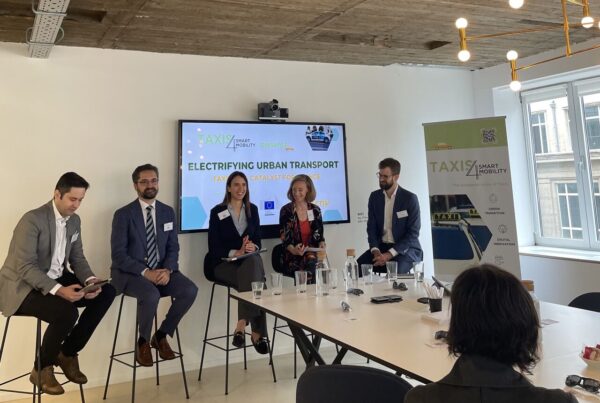
Decarbonising urban mobility means building the right local ecosystems. Cooperation between cities and taxi drivers, with the support of the EU, is the only way to deliver a fair and sustainable transition for our sector.
On July 16, Taxis for Smart Mobility (T4SM) took part in the European Commission High-Level Stakeholder Dialogue on Corporate Fleets, alongside 16 key industry stakeholders, including vehicle manufacturers, fleet operators, rental companies, trade associations, and NGOs. The High-Level Stakeholder Dialogue brought together representatives from all key sectors affected by the Green Corporate Fleets initiative, with the goal of identifying strategies to accelerate the adoption of zero-emission vehicles in corporate fleets.
The vital contribution of taxis to the discussion
As the voice of European taxi organisations, T4SM believes that fleet decarbonisation should be grounded in strong and coordinated action at the local level – where the operational realities of mobility services are felt most. This is the main message our Vice-Chairman, Armand Joseph-Oudin, reinforced during the dialogue.
“The success of this transition depends on local implementation that is both operationally effective and economically sustainable,” stressed our Vice Chairman, highlighting how crucial is the inclusion and empowerment of local governments in the process of reaching zero-emission vehicles in corporate fleets.
Additionally, T4SM highlighted the unique challenges faced by the taxi sector.
“Taxis are mostly operated by very small businesses with limited financial resources. For the European taxi industry, local conditions play a critical role in this transition. The share of electric taxis across Europe varies widely, with the key difference being the strength of the local ecosystem, notably on access to charging infrastructure, financial support, and cooperation with local authorities.”
What needs to change to complete the transition?
To ensure that upcoming EU policy measures are effective, inclusive, and realistic for the taxi sector, T4SM calls for four key enablers:
- Local transition plans
Avoid blanket mandates – focus on local realities instead. Empower local authorities to co-develop transition roadmaps with taxi operators, tailored to local conditions like fleet profiles, charging access, and driver income levels. - Public transport recognition
Taxis are an essential part of urban mobility and should be formally recognised as such in EU policy. This means eligibility for public transport subsidies and inclusion in sustainable mobility planning. - Fit-for-purpose infrastructure
Support the rollout of fast-charging stations at key taxi hubs (e.g. airports, train stations, city centres) and enable home charging access in collective buildings. Use the EPBD and upcoming EU Grid Package to remove barriers and boost deployment. - Targeted financial support
Most taxi operators are SMEs with limited capacity to invest. EU and national schemes should provide tailored incentives, including but not limited to up-front grants, tax credits, and accessible financing, to help drivers make the switch and to avoid potential driver shortages.
T4SM welcomes the Commission’s ambition and thanks the European Commissioner for Sustainable Transport and Tourism, Apostolos Tzitzikostas, for bringing key stakeholders together for this crucial discussion on Europe’s future. Our Coalition, representing the voice of the European taxi industry, is committed to achieving these goals and looks forward to continuing collaboration with the EU institutions to drive a sustainable and inclusive transition.




